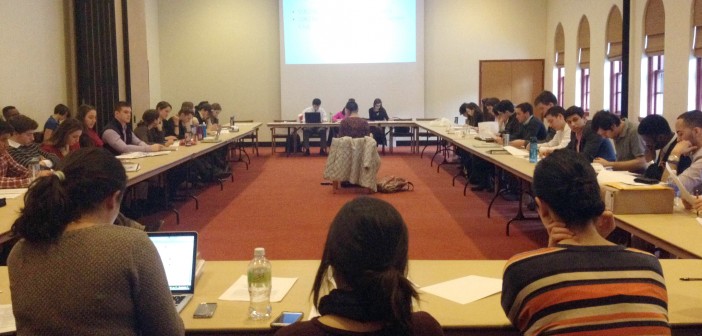This is the first in a series of articles about the role of Student Senate on Lehigh’s campus.
| Student Senate XXIX executive board |
| President — Dakota DiMattio |
| Vice president — Yasmina Sirgi |
| Treasurer — Matt Rothberg |
| Secretary — Aislinn Strohecker |
| Parliamentarian — Alana Hill |
Every other Tuesday afternoon, 50 undergraduate members of the Lehigh community meet on the third floor of the UC to discuss issues pertinent to students at the university. They vote on club funding bills, they speak to faculty and staff members, they hear updates from committees. They are Lehigh’s Student Senate XXIX.
Student Senate is comprised of five constituencies — fraternity, sorority, off campus, on campus and first year — of nine senators each. With five executive board members, a full senate totals 50 members. The senators are elected by the campus community and the executive board is internally elected. If seats are vacated, there is an internal election for at-large seats. If seats are vacated, there is an internal election for at-large seats.
Executive board
The executive board of Student Senate XXIX is made up of president Dakota DiMattio, ’17, vice president Yasmina Sirgi, ’18, treasurer Matt Rothberg, ’18, secretary Aislinn Strohecker, ’18, and parliamentarian Alana Hill, ’19.
DiMattio’s role as president includes overseeing the executive board and running full senate meetings, which take place every two weeks. She also works with administrators to present what Senate is working on and what students are talking about.
The president sits on Lehigh’s board of trustees with the Senate vice president and the Graduate Student Senate president, Gorgi Pavlov.
DiMattio said one of her main responsibilities as president is to make sure the student’s needs are heard.
Sirgi’s role as vice president is more hands-on. She makes sure Senate committees have the resources they need to accomplish their goals. Sirgi does this by checking in with the heads of each committee to see how things are going from week to week. This year, she has also assigned one executive board member to attend a committee’s meeting and report back to her on its progress.
The vice president is also in charge of the elections committee. If there are open spots on Senate, Sirgi is responsible for filling those spots and interviewing the candidates who apply.
Rothberg said his position as treasurer is comprised of two main objectives. First, he serves on the executive board to help Senate function as a whole and second, he works as treasurer to oversee the allocations committee.
He said the student life series funds are distributed to clubs by Student Senate, and it’s the job of the treasurer to help that process go smoothly. The allocations committee gets funding requests from the more than 130 clubs it supports, and Rothberg leads the allocations committee to budget the money to those clubs.
As secretary, Strohecker takes notes and attendance at meetings, sends out meeting minutes and answers Senate emails.
As parliamentarian, Hill oversees the bylaws committee and helps the president adhere to Robert’s Rules, which are international parliamentary procedures, during meetings.
“The executive board works together to make the cog that is Senate function and keep spinning,” Rothberg said.
Committees
| Student Senate committees |
| Standing |
| — Club affairs |
| — Allocations |
| — Public relations |
| CLIP, campus life improvement project |
| — Transportation |
| — Safety |
| — School spirit and events |
| — Student outreach |
| — Diversity and inclusion |
In addition to attending full Senate meetings, senators are divided into nine committees to focus on particular campus issues.
There are three standing committees: public relations, allocations and club affairs.
The public relations committee publicizes Senate and Senate-sponsored activities and improves communication between Senate and the rest of the Lehigh community.
The club affairs committee gives Senate recognition to new clubs and makes sure that already recognized clubs are maintaining the standards needed to stay recognized.
The allocations committee puts forth suggested bills with its recommendations for funding, and full Senate approves or denies them.
There are five CLIP — or campus life improvement project — committees, which can change from year to year depending on the needs of the Lehigh community as gauged by an annual survey Senate sends to the student body. This year’s CLIP committees are transportation, safety, school spirit and events, student outreach, and diversity and inclusion.
“The sky’s the limit for them,” DiMattio said. “Whatever their committee wants to do on campus, they have full reign and Senate will support them.”
The CLIP committees meet to discuss their chosen topics and decide what can be done to improve campus life relating to the particular area of focus. These groups have more autonomy than standing clubs, which have specific tasks to fulfill.
As of Sept. 24, Senate had an available budget of $57,906.54. Rothberg said the goal is to spend in the range of $20,000 to $25,000 of this budget to allow for rollover. The budget bill is proposed by the allocations committee and voted on by full Senate at its biweekly meeting.
This total includes the annual funding minus the budgets for sponsored level clubs, which receive full-year budgets that are taken out of the funds at the beginning of the year. The committee tries to keep rolling funds over each year in case there’s something big that needs funding.
“It’s a safety buffer,” Rothberg said. “We don’t know how much money we’ll need in years going forward.”
Jurisdiction
DiMattio and Sirgi both said sometimes students are not clear about what Student Senate does and does not have power over.
DiMattio said Senate does not have control over parking services or school dining. These, and more, are services that the university has contracts with, so there is not as much room for student intervention. DiMattio said incremental changes do happen every year, but there’s no overhaul.
However, Sirgi said Senate has a lot of say in what the administration thinks students should be a part of. Over the past year, for example, Senate has had input on the UC renovation project and helped to modify the university’s pass/fail policy.
“It’s kind of those little things that no one really notices are changing, but actually are,” DiMattio said.
Goals
DiMattio, Sirgi and Rothberg all said they wanted to see more involvement in Senate from the rest of the student body. All meetings — both full senate and committee meetings — are open to the Lehigh community.
“We think it’s really important, because if (students) want to learn more about the process, (they should) show up,” Rothberg said.
DiMattio said Senate is supposed to be the student voice of the university, but she is not sure if everyone looks at Senate in that respect. She wants to see greater engagement from the student body and wants to increase Senate’s transparency. She said she hopes an increase in transparency will change students’ perceptions of the organization.
“People think, ‘Oh, that’s the way it is, and that’s the way it’s always going to be,’ but it’s not,” DiMattio said.
One way Senate is doing this is by holding office hours in places around campus to invite students to come and talk to senators.
“We definitely welcome people to come in and tell us their issues,” Sirgi said, “because if we don’t know how people are having problems on campus we can’t really do anything to fix it.”
Rothberg said another issue Senate is trying to tackle is getting athletes more involved in the organization. DiMattio said this is a part of the campus Senate cannot reach and therefore is not as aware of its needs.
Two athletes were elected to Senate this year, but the organization is still working on ways for them to get involved because their team practices conflict with a lot of the meeting times.
DiMattio said the mission statement of Senate is to work to improve the quality of academic experiences and the campus.
“A lot of people think the administration has the final say on what we do, which is true to an extent, but also we’re the voice of the undergraduate student body,” Sirgi said. “So a lot of people don’t know that they can come talk to us about issues.”






Comment policy
Comments posted to The Brown and White website are reviewed by a moderator before being approved. Incendiary speech or harassing language, including comments targeted at individuals, may be deemed unacceptable and not published. Spam and other soliciting will also be declined.
The Brown and White also reserves the right to not publish entirely anonymous comments.